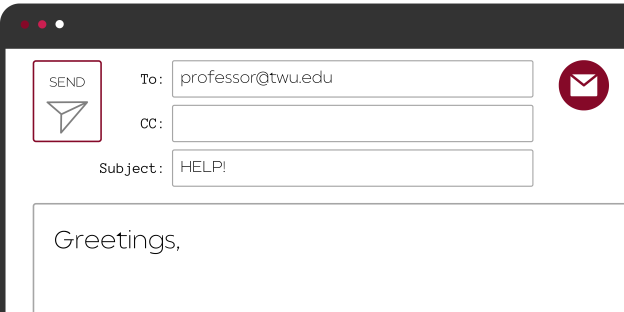Written by Cameron Henderson
I’ve been a student, I’ve tutored, I’ve acted as a graduate assistant for different professors, and I’ve even taught college courses myself. In that time, I’ve survived on the power of the college email. I find that one of the things that often comes up in discussions between educators is student email etiquette:
Professor: “Argh. I got an email that just said, ‘what’s my grade’ today, from someone with the email address ‘soccergirl28.’ How am I supposed to answer that question?”
Opinions vary – of course, I don’t expect every student to know the unofficial email “rules” with which long-time academics are often so familiar. However, I do hope, at least, that a student will communicate the information necessary for me to at least be able to do something with it. So consider this blog post a guide for writing emails while in college–what kind of information you need to include to help your professor understand what you need, good ways to introduce your emails, and good ways to sign off. I’m hoping that these tips will help reduce anxiety about emailing and make talking with your professors easier and quicker.
Tip number 1: It’s considered friendly and polite to include a greeting in your emails.
Remember that your professor is a person. Instructors and professors have a lot on their plates, and they receive a lot of emails. A simple greeting is considered to be a basic courtesy, and it doesn’t even have to be anything fancy.
Example: Something like: “Hello, [Professor’s Name], I hope your week is going well.”
The desire for this kind of greeting in student emails varies from instructor to instructor – and not every professor will respond with the same kind of greeting. (I’ve definitely received the “fine – sent from my iPhone” response to a carefully worded email. Don’t take it personally! Like I said, they get a lot of emails.) – but you can’t control how someone else writes. You only have power over your own actions. Including a brief but friendly greeting in your emails is something that will serve you in any kind of school, business, or other formal setting, so I recommend cultivating the practice now!
Tip number 2: Make sure to include relevant identifying information in your email.
Many students assume that simply because they use their student email address, the professor will automatically know who they are talking to and what class it relates to. This is often not the case – especially for undergraduate courses, professors and instructors are usually teaching many classes (up to five in one semester), and each of those classes might have fifty students in them.
Because of the large number of students these professors may be teaching, it’s important to remember to include in your emails your name, the course you’re taking with your professor, and the section or time slot, so that your instructor can access the information you’re looking for without having to go through their courses and look you up. This makes answering your email so much easier and quicker.
Example: My name is _____ _____, and I’m in your English 1013 class at 8AM on Tuesdays and Thursdays.
If you’re sending an email to an office on campus rather than an instructor, you can kind of follow the same pattern. Say that you want to ask a question to someone in disability student services; you could say, “My name is ____ ____, and I’m a freshman in the Kinesiology department.” Just keep it simple, keep it short and easy to read. If someone recommended for you to ask the question, you might mention it briefly. “My professor told me to get in touch with DSS to ask about…”
Tip number 3: Ask your question or state your point in complete sentences, and try to be clear!
I’ve gotten emails that look like this:
From: student@email.com
Subject: (blank)
Where do i turn it in ?
And that’s all the email says. My response: who is this? Turn what in? Which class is this for? What’s going on? Assuming that you’ve followed the other steps, you should have a short greeting and an introduction letting your instructor know who you are. If you have a question about a specific assignment, mention what assignment that is and state your question clearly.
Example: I have a question about the upcoming free write assignment. Where should we turn that in?
Easy, simple, short. You state off the bat that you have a question, mention what it’s about, and then state your question plainly.
If, instead of a question, you want to tell your instructor that you’ll miss a class, here’s some helpful guidelines. Make sure that you read and understand the attendance policy for your class, so you can include the relevant information:
- Indicate that you’ve read the attendance policy:
Example: I saw that the syllabus says we are allowed two class absences if we email you in advance.
- Briefly state when and why you’re missing class. You generally don’t need to give much detail in the initial email. If your professor wants more information, they’ll ask for it in a follow up.
Example: I’m sick/attending to a family emergency, and I won’t be able to attend class this evening.
- Ask for any important information you’ll be missing out on during class.
Example: Are there any notes or slides for the lecture today that I could get a copy of, or should I ask one of my classmates for their notes?
- Add a “please let me know if there’s anything else you need from my end” – that way, if the professor wants a medical note or something like that, you had the idea to clarify first!
These steps will show that you’ve paid attention to the syllabus and that you are thinking ahead in terms of staying on top of your classwork.
Tip number 4: End your email with a polite sign off and restate your name.
This is another opportunity for you to make it easier for your professor to see who they’re talking to, as well as a space for you to thank them for their time. It’s always nice to respect other people’s time!
I usually sign off my emails with a simple “Thank you” or “Thanks in advance.” You could also say “Thank you, and have a great weekend/evening,” and then restate your name on the next line.
Tip number 5: Try and write something in the subject line that briefly tells your professor what your email is about. It does help, trust me.
Additionally, It never hurts to run your email through a word processor (like Word or Google Docs) before you send it. Give that baby a quick spellcheck! (My mom does this every time she sends an email, and she swears by it – her boss has even commented on how clean her emails are!)
PUT IT ALL TOGETHER – EXAMPLE EMAIL:
Any similarity to real people’s names or objects sitting on my desk while I write this is purely coincidental. (Be nice to me, I’m trying.)
Subject: Question about the discussion
Hello Dr. Notebook,
I hope your week is going well! My name is Coffee Mug, and I’m in your 8am English 1013 class on MW.
I had a quick question about the upcoming discussion post. In our responses to two different classmates, are we supposed to bring in quotes from the text, or can we just respond with our own ideas?
Thanks, and I’ll see you in class next week,
Coffee Mug
—
See? Easy, simple, polite, to the point. Your professor knows exactly who they’re speaking with and can give you the information quickly, so you can finish your assignment.
Note that each part of the email is on a new line – please hit enter after your greeting and the body of your email. Small bits of text are also easier to read than big blocks – don’t be shy about making a new paragraph in the middle of the email’s body.
And that’s it! Enjoy your emails, and good luck this semester!





